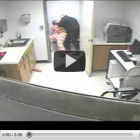
The Anniston Star has this followup on the Alabama sheriff under investigation by the FBI after allegedly using manual force on a juvenile. A Calhoun County, Al., Sheriff’s Office program for youthful offenders and suspended-from-school teenagers to work in the county jail sounds remarkably similar to programs banned by federal and state law, officials say. Those programs, commonly called “scared straight” or “shock incarceration” programs, became popular in the 1970s as a way to scare or shock youthful offenders or juveniles prone to misbehaving into more appropriate behavior, a policy expert at the Washington D.C.-based Coalition for Juvenile Justice said. But a range of state and national juvenile-justice officials said that years of research have proven the scared straight concept to be in error; those same officials say that such programs are violations of the federal and Alabama laws, which prohibit youthful offenders from being detained or confined in adult corrections facilities. And all of those officials say the description of a Calhoun County program jointly run by the Sheriff’s Office and Family Links, Inc., a children’s behavior task force for the county, falls under the umbrella of those legally questionable programs.
Read more:Anniston Star - Legality of jail program questioned
Read more of JJIE's Scared Straight coverage here and here.









